
3 minute read
NO HOME FOR HATE
By Dr. Tonisha Pinckney
n the quiet town of Conway, South Carolina, the lives of Soror Monica Williams and her husband Shawn Williams were upended in a deeply personal event that echoed some of the darkest chapters of American history. Mr. Williams expressed, “This home is supposed to be our place of retirement, a place of peace, a place of respite, and a place for all of our family together.” However, that peace was pierced by the trauma of racism and hatred.
In late November 2023, their sense of security and belonging in their community was shattered when a cross was set ablaze on their property. This act, a stark reminder of a past many hoped was long gone, was not a spontaneous occurrence but the culmination of a two-year sustained campaign of harassment and intimidation from their neighbors, according to Soror Williams. The cross-burning incident not only terrorized the Williams family but also sent shockwaves through their community, the nation, and the sisterhood, eliciting feelings of fear, anger, and a resounding call for justice that rippled through social media outlets, mainstream media, and political arenas.
When Hate Visits Home
The harrowing events of Thanksgiving night in 2023 starkly revealed the depths of racial animosity. While the Williams family gathered for a time of family and fellowship in their predominantly White neighborhood, they became the target of a calculated act of hate. Allegedly, their neighbors, Worden Butler, and Alexis Hartnett, erected and set fire to a cross in plain view of the Williams’ home. This egregious act followed a two-year period of racial slurs and threats directed at Soror Monica Williams and her family.
The burning cross was not just an act of physical intimidation; it was a psychological assault, a message steeped in historical racism and violence. Mr. Williams described it as an “act of domestic terrorism,” emphasizing the symbol’s association with racism, specifically anti-Blackness. They endured not only the immediate threat to their safety but also the deep emotional and psychological scars such an act can inflict.
The response from the community and local law enforcement was swift but inadequate, reflecting the gravity of the situation. When asked about the police response, Soror Williams recounted, “that night, when all of this went down, she [Harnett] was coming out the house screaming and hollering, calling us all kinds of racial names in front of the police. They didn’t do anything.” Mr. Williams added, “they were so nonchalant and didn’t have any sense of urgency” when they responded. The incident spurred a broader discussion on race relations in the area, bringing to light the undercurrents of racism that still exist in many American communities. For the Williams, the incident was a tragic reminder of South Carolina’s history, including the 2015 mass shooting at Emanuel African Methodist Episcopal Church, “Mother Emanuel.”









